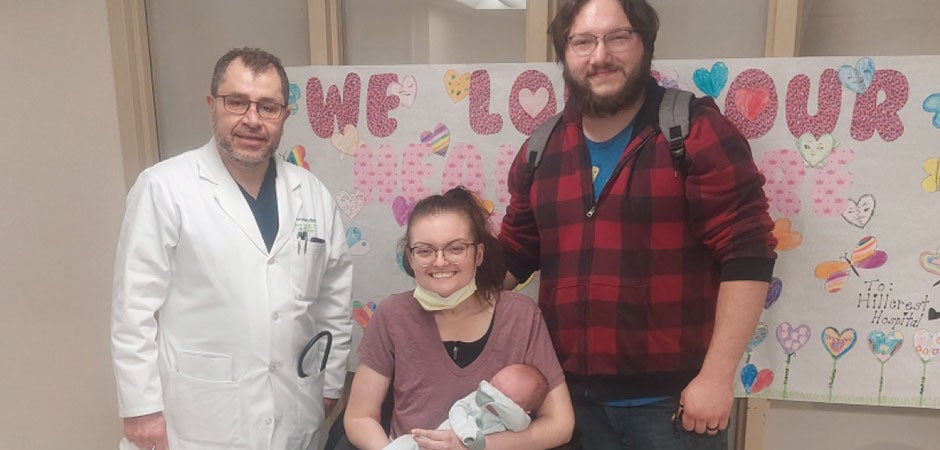
Bri Hadley had a tough time keeping food down the early stages of her pregnancy in 2021. She lost 75 pounds during her gestation period. When Hadley started experiencing numbness in her legs, she believed her symptoms were the result of malnutrition.
Hadley immediately received artificial nutrition through a round of IV supplements. But her condition worsened. By the next morning, Hadley could not walk. She was then put on bed rest, again told lack of nutrition was the culprit.
“I was able to put down a bit of food,” Hadley said. “But my husband had to carry me to the bathroom or to do anything.”
The next morning Hadley could not even sit up. When she alerted her doctor, Hadley was admitted to Hillcrest Medical Center (HMC). Over the next four days, she got progressively weaker, losing her voice and eventually was unable to swallow anything without choking.
Hadley was moved into the Alexander Burn Center ICU after experiencing progressive weakness and concern for her respiratory status. After a litany of tests, she was diagnosed with Guillain-Barré (gee-YAH-buh-RAY) syndrome.
This disorder occurs when the body’s immune system attacks its neurological system and can result in paralysis. Guillain-Barré syndrome affects an estimated 3,000-6,000 people each year in the United States, according to the Center for Disease Control and Prevention, or about 1 in 100,000 people.
“Her history was matching Guillain-Barré,” said Ghassan Tawil, M.D., a critical care specialist at HMC, who was part of Hadley’s care team that came to the diagnosis.
As Hadley’s condition deteriorated, she was intubated and put on a ventilator. Her condition required a plasmapheresis, a procedure used for autoimmune diseases that essentially removed the antibodies from her system through a catheter and return clean blood back to her.
In addition to her own health concerns, Hadley and her husband, Josh, had to consider the well-being of their baby as well. At 26 weeks, Eli made his debut via cesarean section on Nov. 12. The newborn, weighing 2 lbs., 6 ½ oz. at birth, spent two days on a ventilator and was in the NICU for 80 days before coming home.
“He’s a miracle,” Bri said of her son. “I have no idea how he did it.”
With Eli coming sooner than expected, Hadley never had a formal baby shower. The burn ICU nursing staff put together an impromptu celebration for the family.
“That was really awesome of the staff to do,” Josh said. “That meant a lot to us.”
Along with the plasmapheresis, Hadley required tracheostomy. Her condition improved and she was eventually weaned off the ventilator, then the tracheostomy tube was removed from her lower neck. Hadley was transferred into the stepdown ICU and moved to the HMC Kaiser Rehabilitation Center on Dec. 17. In late January, Hadley was able to leave the hospital. By that time, she could talk and move her hands, both signs of significant improvement in her recovery process.
“It felt really good to leave,” she said. “It was also scary because we had so much care at the hospital, and now we were left on our own.”
She remained an outpatient with Kaiser with three occupational and physical therapy sessions each week. As of April 2022, she had regained feeling in her legs and feet, could remain standing with assistance and her voice was almost back to normal.
Hadley said she was appreciative of how her care team went the extra mile. She detailed a few of those examples.
“In order to keep my hair from getting extremely matted and dirty, they would come and brush my hair and French braid it whenever they had the free time,” Hadley said. “They would also bring in this hair washing bucket and shampoo my hair with actual shampoo and water instead of just the traditional shower cap. When I finally was off the ventilator but wasn't able to sit up, the nurses would take me back to the tank room to get a proper shower. One nurse even went down to the gift shop and bought me a soap set that smelled good. Also, whenever my fingernails got just a little too long one nurse bought a nail file and some nail polish and we had a girls’ night where I watched my favorite movie on my tablet while she did my nails. After I had Eli, the labor and delivery nurses from the Women’s Center sent us a card with a Visa gift card so we could get what we needed for him. The most important thing one of my nurses did was write these messages on my board and she would remind me of what they said when my anxiety or depression would get bad. On top of the nurses being incredible, the physical, occupational and speech therapists, they constantly went out of their way to think of new games and activities that keep me engaged while having fun.”
Tawil said Hadley’s case was a tremendous example of the entire care team working together.
“The teamwork surrounding her in burn ICU was excellent nursing care,” he said. “Everybody was aware of the circumstances and what she was going through.”
